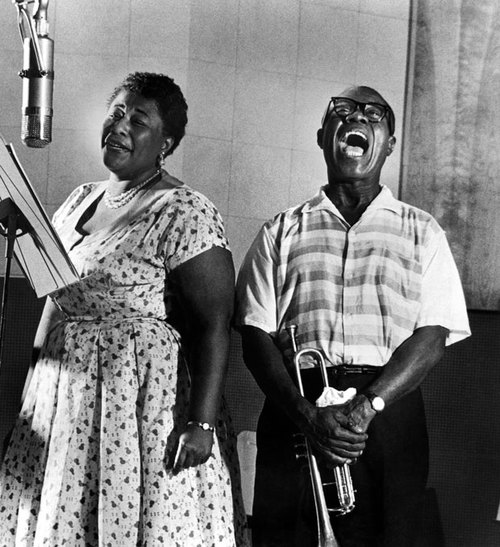The two people most responsible for bringing jazz music into the mainstream got together 60 years ago this month and cut a record that is now an historical touchstone. I’m speaking of “Ella and Louis” the first duet album by jazz titans Fitzgerald and Armstrong.
But the unsung hero of this project — and of popularizing jazz music as well as integrating audiences and venues — was Norman Granz.
“Ella and Louis” fueled a revival of that body of work we call The Great American Songbook — a treasure trove of music mostly created by white Jewish men — and spread it to a multi-cultural audience. And there it sits today, with most major artists giving their take on the various songs in the (informal) Songbook. In fact, Michael Feinstein gets a laugh out of telling audiences his name for it — “the Rod Stewart songbook.”
Norman Granz was a music promoter, concert impresario, talent agent and founder of several record labels — the best-known and most successful of which is Verve. His name is synonymous with jazz music to those in the know.
Most of the big-name jazz stars you’ve heard of were on a Granz record label and a Granz-produced concert. He was white and Jewish and was determined to integrate jazz music through music.
His biggest accomplishment was probably JATP –“Jazz at the Philharmonic” — which became a catalog of firsts.
In 1944 the Philharmonic Auditorium in Los Angeles had never featured jazz music before, and it didn’t intend to until Granz started working on them. The first concert was so successful that several more followed. JATP became international concert tours and popular live albums.
Using an integrated bill of performers, Granz refused to book the show at segregated theaters and halls. The tour ran for over ten years, until about 1957.
But as well as getting the music out to integrated audiences in integrated music halls, Granz got the musicians higher pay and acceptance at formerly segregated lodging while on tour.
He later tackled the task of integrating the hotels and casinos in Las Vegas.
In other words, the Norman Granz legacy is monumental. And along the path, his career was marked by remarkable accomplishments. And that was perfectly exemplified by the album he produced 60 years ago — “Ella and Louis.”
“It was perhaps more of a cultural leap, in the middle of that tumultuous century, that two black performers could be considered the best interpreters of white show tunes, and that the extemporaneous heart of jazz could elevate the whole to iconic status, desegregating American popular culture in just eleven songs.”
For the full story behind this album, you can check out this link:
https://blog.longreads.com/2016/11/07/the-story-of-ella-and-louis-60-years-later/
